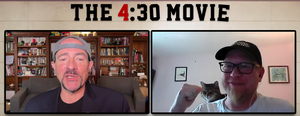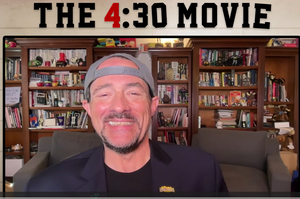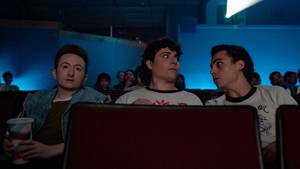Kevin Smith’s THE 4:30 MOVIE is coming home today, available on digital through all major retailers. The film tells the story of young Brian David, an avatar of Kevin Smith, and his adventures at the local Atlantic Cinema where he watches films with his friends Burny and Belly in 1986. It’s a departure from the View Askewniverse that Smith started thirty years ago, which admittedly stretched to its possible breaking point as the characters within encountered rebel angels, demons, Hollywood, jewel thieves, terrorists, and a monkey. THE 4:30 MOVIE offers a much more grounded story of a simpler time when the cinema and video store ruled the weekend, and the lives on the silver screen either mirrored our own or showed us worlds we could only imagine.
I had the opportunity to chat with Kevin Smith yesterday in support of the film’s digital release and it went exactly as I thought it would: we were given six minutes, I asked one question, and he talked for eight. What I got in that response, though, was a good deal of wisdom about what the filmmaker attempts when he puts his memories to screen for our amusement, how he’s remained relevant, and where his ideas originate. Prior to the interview’s start, my cat Bennie decided she needed to be part of it all, as well, and leapt onto the seat behind me.
Eric McClanahan - Hi Kevin!
Kevin Smith - Hello, Eric! How are you?
EM - I’m well, thank you!
KS - Look at that cat! Look at it, hiding there! A fucking, just pussy shot, right there! Way to open it up!
EM - Oh yeah, she’s a bigger fan than I am! She was like “I gotta get in on this.”

KS - Oh, I don’t know, man. I can see it in her eyes. She’s like “He WAS good. Lately, though, I don’t know. He’s hit and miss.”
EM - [laughs] “He was better in the nineties.”
KS - [laughs] Exactly.
EM - Let’s get right into it: you’ve been telling View Askewniverse stories for thirty years. And now you’ve decided to tell what is essentially your own story. Why now?
KS - I mean, to be fair, even the View Askewniverse stories are me and mine, man. Right? Like CLERKS is probably about as autobiographical, probably more so, than THE 4:30 MOVIE. CHASING AMY, same thing. So I’ve always stolen very liberally from real life to tell stories; I’m not very inventive or original. I’m like ‘This happened to me. Let me make a whole ass movie about it.” And so for me it doesn’t feel much different than the other ones, in terms of the impetus or in terms of how much it steals from real life. Like the Saban folks in their press materials say “It’s his most personal film to date!” And I guess maybe they’re right in that there are versions of my parents in this movie, but all the movies for me, I’ve always played them personally. This one probably feels more so because it’s like “He owns the movie theater!” In that way it’s kind of a variation on CLERKS - I didn’t own the Quick Stop but I did work at a place where the location dictated the film. Before there was an idea of a movie, there was the location, and the location gave birth to the idea of making the movie. Just like Quick Stop gave birth to CLERKS, Smodcastle Cinema gave birth to THE 4:30 MOVIE, because I was like “Oh shit, man, we have our own location, we can shoot a movie here! And I know the guy [who owns it] so it’ll be cheap!” So it’s not so much me going, “Well, I’m fifty-four and it’s time to look back.” I’ve been looking back since the first movie. And I’ll be honest with you: I’ve been looking back since I was in single digits. I remember being reminiscent and nostalgic for an episode of “Happy Days” when it ended once when I was a kid.
So, that’s always been my makeup: Looking Back. And I think I figured it out on this movie, because most of the movies I’ve made for the last decade I’ve been high while I was making them and this movie I was not, I was crisp the whole fucking movie. Just like a cat and shit. Just like that cat behind you.
EM - Not so much now.
KS - Yeah, she was like “Oh he’s talking, I’m going to sleep.” But for me, it was, I think I figured it out: I’ve spent my life, thirty years of a career now, trying to capture moments and feelings that impacted me deeply and shifted the narrative and changed me as who I was. So when you look at CLERKS, that’s it. That’s me trying to say “hey this happened, and this happened.” Same thing here, same thing with THE 4:30 MOVIE. But with THE 4:30 MOVIE, more so than trying to convey it with an assload of dialogue and clever things and fucking dirty shit you never heard before, it’s me trying to dial in and capture how it all felt, more than anything else. And capturing that artificially; it’s crazy. Like I was sitting there on set going “This shit happened to me and now here I am decades later with a crew and cameras and people that I’m like You pretend to be me and you pretend to be him and lie about who you are with fake names and pretend it’s the eighties. Now go!” You know, putting it through that filter of artifice, trying to show people this profound moment that impacted me - does it still work? Does it do the same for you?

It’s nice but it’s also bittersweet because then you take these moments that are authentic and real to you and they become cheap facsimiles of the real thing. They’re the closest you can approximate with the means you have. We don't have time machines but we do have cameras so we can kind of make our version of it. For the rest of my life I will interact with these movies and audiences will watch them and move on to other movies, but they’ll stay vital in my world; I’ll be talking about them as if we just made them the other day for the rest of my life. So I’ll bump into these moments while I’m showcasing the movie or doing a Q&A or just trying to do research for another movie I’m making, going back and watching that flick, and then I see this artificial version of the moment that happened to me in real life and I’ll get this warm smile, like, “Oh shit, that was something I gave up.” Like it was so important to me that I wanted to give it up, and that’s a bittersweet trade because it’s no longer yours. It belongs to everybody else but that’s a good thing. Because you hope that it translates.
I think that’s why, over the course of my career, over thirty years, when it didn’t connect, and it felt so personal. It’s like “No, this is me trying to show you something. Something beautiful.” And even when you’re trying to make people laugh, it’s a similar thing. Most of the funny conversations that I’m trying to set up are variations of funny conversations that I’ve had. So I’ve always been trying to pull from real life - not even trying, that’s all I can fucking do. God forbid someone ask me to tell an original story, I’d be like “I don’t know how to do that.” And I imagine I’ll be doing that for the rest of my life, as well.
Right now I’m writing a thing, though, that doesn’t pull from my real life at all. It can happen. Like RED STATE didn’t pull from my life. I didn’t live through those kinds of events and shit. DOGMA, even though it didn’t happen to me, the Catholicism of it all, that did kind of happen to me. But I know as a storyteller I should be trying to improve my storytelling craft all the time and reaching for Oscars and shit like that, but for me it’s enough to do what I’ve been doing for the last thirty years. When it connects, it’s fucking magical. When it doesn’t connect, it’s heartbreaking.
But you always get another chance. Well, you hope you get another chance. Because you know what? You don’t always get another chance, you can’t count on that, because a lot of the people I came up with ain’t doing the job anymore. You know what I’m saying? Like some people have to wait for permission, but I came up in indie film, so that’s not the mindset I was born in. My mindset I was born in was “I don’t need fucking permission. I’m just going to do a thing.” So it’s always heartbreaking for me to see my… betters, people who are better at this fucking job than I am, not doing it because they haven’t been given the money or the permission and they just don’t know another way at the job. Mercifully for me it’s like If we can’t get this money, I’ll drop the budget in the toilet and we’ll do it for this money, but it will get done, because it’s not about making perfection.

The reason I’ve been doing it for thirty years is because I’ve got two words, two magic fucking words, man, that fucking help make any Kevin Smith movie: Good enough. Like most people, like [Christopher] Nolan, man. Nothing’s good enough for Nolan. He has to go for perfection and that’s why he’s the filmmaker he is and he makes great films. I’m the other guy. I’m like “That’s good enough.” We shoot a thing and I’m like [shrugs] That’s good enough. [looks around] Fuck it. Everyone happy? Moving on. And then you go forward. If I was waiting “No, we got to get the perfect moment. We got to capture the perfect shot,” I wouldn’t be here having this conversation. “Good enough” will take you thirty years into a career and it’s too late to change that mindset now, and I wouldn’t want to, because it really paved the road for me. I’m glad there are people out there that go for exceptional filmmaking and make the cast and crew take the journey with them, sometimes they suffer for it, but whatever. The art is the all-important thing. Nobody should ever suffer for a fucking Kevin Smith movie, so “Good enough” will take you far. And it’s taken me three decades in, sixteen movies, so far, so good enough.
EM - Excellent. Well, we are out of time, but thank you so much. I really enjoyed this and we’ll talk again soon.
KS - Such a pleasure seeing you. Bye to the kitty. Pspspsps [laughs].
Of course I had other questions, but I was happy with what I got. I wanted to ask about the cameos and if there was one he really wanted that he was unable to get. I wanted to talk about the films within the film and if any were left on the page or cutting room floor. And I also wanted to ask how he felt about his Batman villain creation from the CACOPHONY book, Onomatopoeia, making the leap into canon by appearing in Bruce Timm’s BATMAN: THE CAPED CRUSADER earlier this year. Perhaps we will have a chance in the future.
THE 4:30 MOVIE is available on digital through all major retailers today, October 1st.
Until next time, take care.
-McEric, aka Eric McClanahan-

